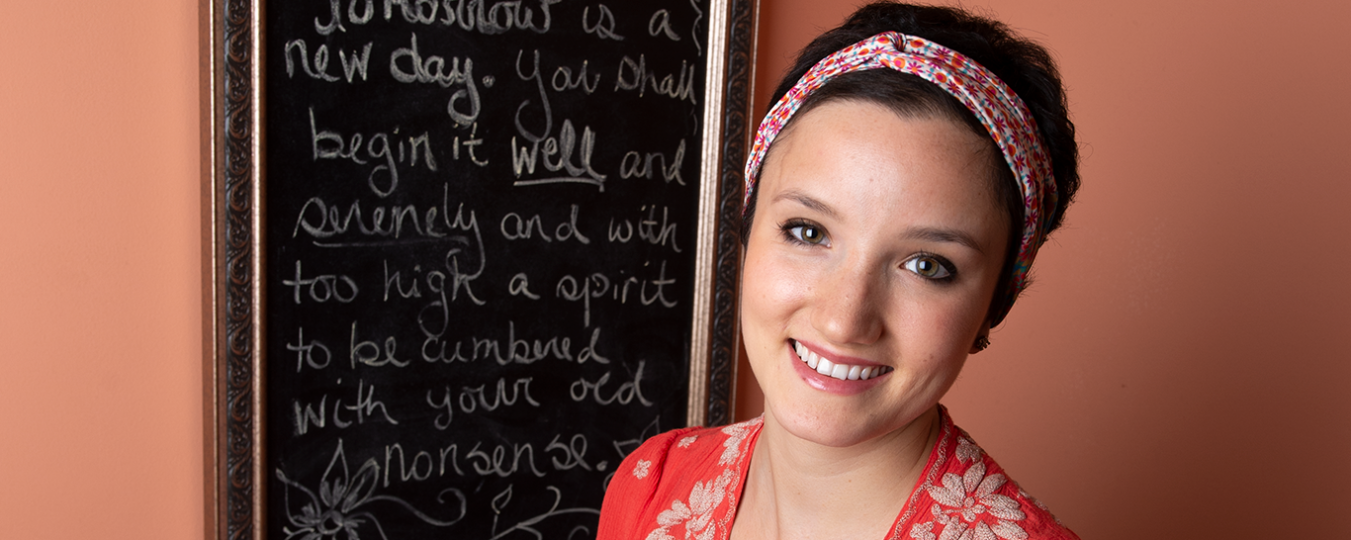After Brain Surgery, Kelsey Flanigan Pushes On
Kelsey Flanigan, a budding comedy writer and performer, was vacationing in Thailand the summer after graduating from Rutgers University in 2013, when she suffered a seizure. Arriving home in New Jersey two days later, Flanigan was so tired she waited until the following day to tell her parents what happened. Her mother took her to a physician right away and Flanigan had an MRI. The physician called them into his office, and pointing to a large, dark shadow on the MRI, said, “That’s a tumor, a big one. You need to see a neurosurgeon right away—like today.” He recommended Rutgers Cancer Institute of New Jersey's Shabbar Danish, saying he was “one of the best around.” In shock, they went straight to his office, her father rushing from work to meet them there.
Ultimately, Flanigan was diagnosed with a grade III astrocytoma, a rare brain tumor with astrocytes—star-shaped cells with ‘arms’ that penetrate many areas of the brain. In the world of brain tumors, all are worrisome; it’s just a matter of degree. An astrocytoma is a serious tumor that requires aggressive therapy.
Dr. Danish, who specializes in minimally and noninvasive solutions to treat brain and spine cancer and has research interests and publications in both fields, is the chief of neurosurgical oncology at Rutgers Cancer Institute of New Jersey, part of Rutgers Health, and assistant professor of neurosurgery at Rutgers Robert Wood Johnson Medical School, also part of Rutgers Health. His multidisciplinary team includes neuro-oncologists, neurosurgeons, radiation oncologists, nurses, social workers, and other specialists.
First Surgery
After assessing Flanigan’s tumor, which involved most of the right frontal lobe, an area of the brain that controls key neurological functions, Dr. Danish told Flanigan she needed surgery to remove it. The next step would be radiation and chemotherapy. “The idea of having a tumor was bad enough,” Flanigan recalls. But someone cutting it out of my brain was even more terrifying.” One memory of that day stands out: the neurosurgeon offering words of comfort, calmly giving Flanigan and her mother time to compose themselves. “He was very caring and patient,” she continues. “He let me cry. When I was done, he explained what we had to do.”
On January 30, 2014, Flanigan underwent a craniotomy at Robert Wood Johnson University Hospital, the principal teaching hospital for the medical school. In the five-hour procedure, Dr. Danish first made an incision in the scalp, then drilled a series of small holes in the skull and connected them to remove a section of bone. “We excised the most malignant part of the tumor but could not get it all without affecting neurological function,” says the neurosurgeon. “There are many risks with this type of surgery—including the possibility of neurological deficit, stroke, hemorrhage, or infection. She came through really well.”
Dr. Danish is an expert in hard-to-treat cancers, including primary brain and spine tumors as well as secondary tumors that begin in the breast, lung, or prostate and spread to other parts of the body. He has fellowship training in high-tech procedures to fight cancer and is director of the Stereotactic and Functional Neurosurgery Program at the hospital. Stereotactic surgery treats lesions and tumors in the brain and upper spinal cord without harming healthy surrounding tissue. Unfortunately, Flanigan’s tumor was too large for this type of procedure.
A Doctor-Patient Connection
To plan her next phase of treatment, Flanigan and her parents visited major cancer centers across the country, but in the end opted to return to Rutgers Cancer Institute. “I felt comfortable here and was confident I was getting the best care,” she says. “Dr. Danish is great. No matter how many questions we have, he’s never too busy to answer them. There’s a connection I’ve never had with any other doctor.” On May 14, 2014, Flanigan had a successful second craniotomy to remove remaining traces of the tumor.
Flanigan knows an astrocytoma is nothing to take lightly. In the fight of her young life, she is working hard to keep negative thoughts at bay. “On my worst days I’ve felt an inner strength pushing me,” she says. “It’s a strength I’ll try to never let go of.” As Flanigan continues her recovery, she still dreams of going to Los Angeles and finding a career in film or comedy. But right now she takes things day by day. “Sure, sometimes I ask, ‘Why me?’ ” she says. “But I’m so thankful to have come this far and to have connected with such a caring network of people, from my surgeon on down.”

